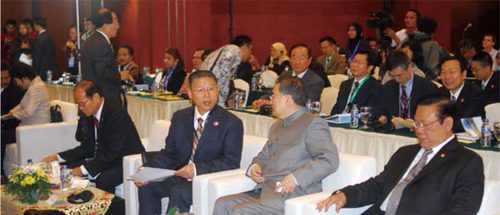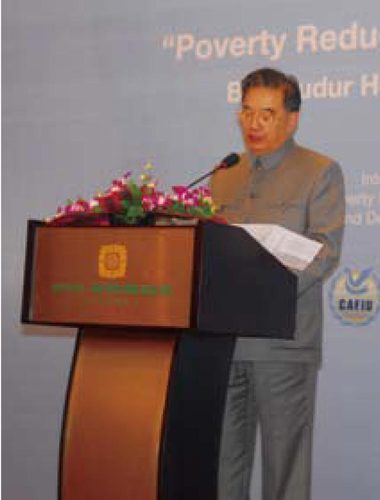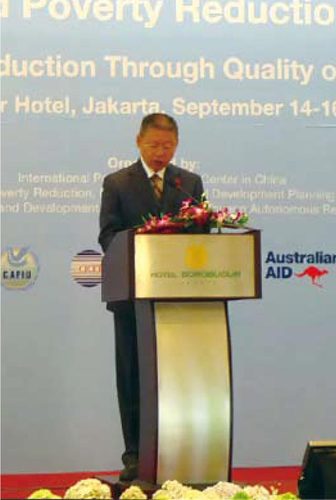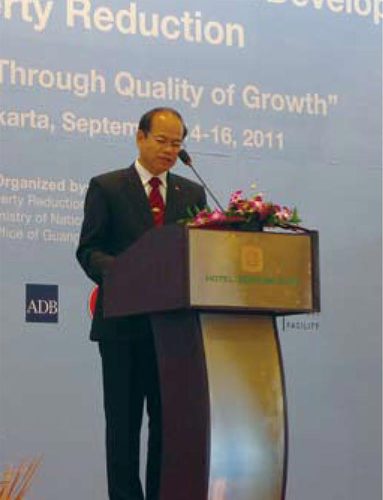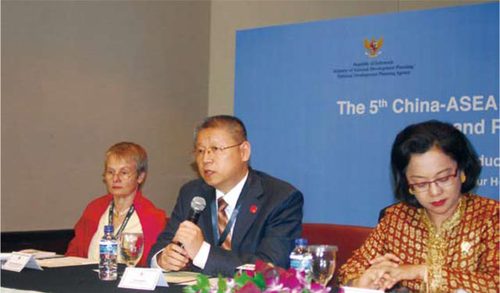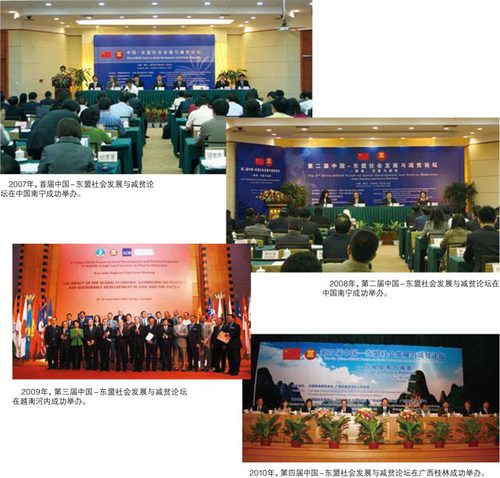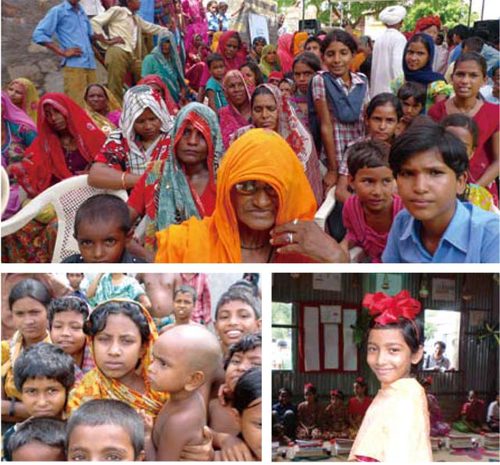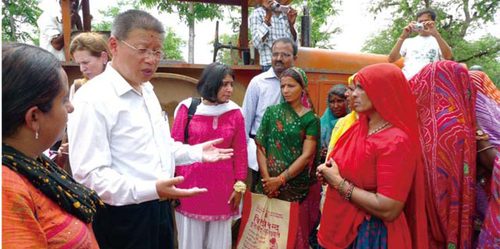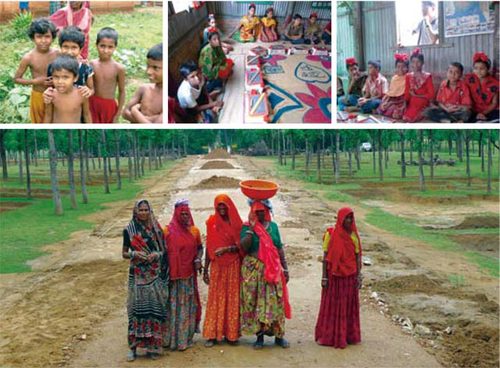The 5th China-ASEAN Forum on Social Development and Poverty Reduction
The 5th China-ASEAN Forum on Social Development and Poverty Reduction was held in Jakarta, the capital city of Indonesia, from September 14 to 16, 2011. This forum, hosted by China’s State Council Leading Group Office of Poverty Alleviation and Development (LGOP) and Indonesia National Development Planning Agency (BAPPENAS), aims to explore the relationship between the quality of economic growth and poverty reduction, and to share the experiences of various countries in terms of improving the quality of growth and enabling the growth to accelerate poverty reduction. More than 200 people including government officials and scholars from China and ASEAN countries as well as delegates from various international organizations such as UNDP, ASEAN Secretariat, Asian Development Bank and International Labor Organization (ILO), attended the forum.
Mr. Li Jinhua, Vice Chairman of CPPCC and Honorary President of China Association of Poverty Alleviation and Development addressed the opening ceremony. Li noted that to eradicate poverty and promote the sharing of social development achievements is the common ideal for human development and the common task of China and various ASEAN countries. Also, it is the shared objective of the Chinese and ASEAN governments to improve the quality of growth so that the economic growth can better facilitate the reduction of poverty-stricken population in order to reach the goal of sustained poverty reduction and development.
Mr. Fan Xiaojian, Director(Minister) of LGOP, said in his keynote speech that this year’s forum, themed on “Poverty Reduction Through Quality of Growth”, probes into issues concerning the improvement of the quality of economic growth and poverty reduction, and aims to share the experience of China and ASEAN countries in this field. In this sense, the forum is of great practical significance. For China, its poverty alleviation and development efforts is entering a brand new stage. In the past ten years, China implemented the Strategy for Poverty Alleviation and Development in Rural China (2001-2010), took the lead in achieving the MDG One of halving the extreme poverty, which was a dramatic contribution to the global fight against poverty.
Sayakane Sisouvong, Deputy Secretary-general of ASEAN, said that ASEAN boasts strong economic growth and some of the ASEAN countries have recovered from the global financial crisis. According to a 2009 Asian Development Bank (ADB) report, there are still 1.6 billion Asians living in less than US$2 a day, and 20% of them living in extreme poverty and less than US$1.25 a day. Therefore, it is necessary to improve the quality of economic development to bring welfare and health benefits to the people at the bottom of the social stratum and reinforce their participation in the economy.
After the opening ceremony, Armida S. Alisjahbana, Indonesia’s State Minister for National Development Planning, Fan Xiaojian, Director General of the State Council Leading Group of Poverty Alleviation and Development of China, Sayakane Sisouvong, Deputy Secretary-General of ASEAN, Ursula Schaefer-Preuss, ADB Vice-President and Beate Trankmann, UNDP Indonesia Country Director held a press conference with the participation of about 40 TV, radio and newspaper correspondents from Indonesia, China and other ASEAN countries. China Central Television’s Indonesia Liaison Office had an interview with Director Fan.
Launched in 2007, the 1st China-ASEAN Forum on Social Development and Poverty Reduction was successfully held in Nanning, China.. Over the past five years, the forum has become an annual platform to boost social development and poverty reduction exchanges between China and ASEAN countries, and bringing positive effects on regional stability and prosperity.
Forum Participants on Field Visit to Indonesian Poverty Alleviation Program Sites
The population of Indonesia is the four th largest in the world, with rich races, culture, religion, ecological and economic forms, and also a number of complex challenges in the progress of poverty reduction. In 2007, the Indonesian government established two important anti-pover ty programs: a conventional cash transfer program called Keluarga Harapan (PKH), and a nationwide community empowerment program called Program National Pemberdayaan Masyarakat or PNPM Mandiri, which integrated community-dominated development (CDD), i.e. Kecamatan developing program and urban poverty program. One of the cores of PNPM Mandiri and PKH program is to transfer the rights of budget allocations down to the community.
Chinese representatives from relevant national ministries and experts present at the China - ASEAN Forum on Social Development and Poverty Reduction were divided into two groups during the investigation. The first group investigated CDD program of PNPM Generasi community which was situated at Sumedung (about three-hour drive) in West Java of Indonesia. The villages involved in the PNPM Generasi program devoted to improving 12 basic medical treatment and education indicators with the fund of 8,400 US dollar per village allocated annually. Trained coordinators help the villagers to get involved in the participatory process of planning, and to find problems and local solutions. PNPM Generasi program was designed to ensure rights and get common people involved, so it can provide intervening measures which are flexible and suitable for local situations. The major beneficiaries are pregnant women, children under five, infants and middle and primary school children.
Chinese representatives visited Generasi, had an informal discussion with the program coordinators, asked questions, and had a deeper understanding of the influence of classified appropriation on stimulating local communities to improve medical treatment and education indexes. An on-site investigation of a health centre for women and children and medical service centre was carried out. The investigation group communicated with the beneficiaries of the program. The second group of Chinese representatives investigated the national PKH program situated at Bogor city/district (one-hour drive from Djakarta). PKH program is a nationwide conditional cash transfer program that provides the poorest families with cash aid. The condition is that the assisted families should invest in long-term manpower development in education and medical treatment of family members.
Through investigating Indonesian poverty relief programs, Chinese experts witnesssed with their own eyes Indonesian anti-poverty programs, had an understandi-ng of the operation, influence and challenges of these programs in local communities, reaching the goal of this on-site investigation. Four representatives from China were also interviewed by local media, talked about their personal experiences relevant to the meeting and investigation. The investigation activities achieved good results.
Theme Report of The Forum Economic Growth and Poverty Reduction:The China Case Study
The 7 findings of the Theme Report:
1.China has shifted from a poor country in late 1970s to a middle income country now;
2.China’s economic growth has a dramatic impacts on its poverty reduction;
3.Success of China’s massive poverty reduction lies in three dimension factors: institutional breakthrough, increases in agricultural productivity and a packaged policy linking development-oriented poverty reduction and social security schemes;
4. China is experiencing a economic structural adjustment;
5.Economic growth in rural China during 2000 to 2010 is not pro-poor;
6. Economic growth in 592 key working counties of national poverty reduction interventions is pro-poor;
7. The inclusiveness of China’s economic growth is in progress after 1990s. but in a slow pace and at a relatively low level.

扫描下载手机客户端
地址:北京朝阳区太阳宫北街1号 邮编100028 电话:+86-10-84419655 传真:+86-10-84419658(电子地图)
版权所有©中国国际扶贫中心 未经许可不得复制 京ICP备2020039194号-2

